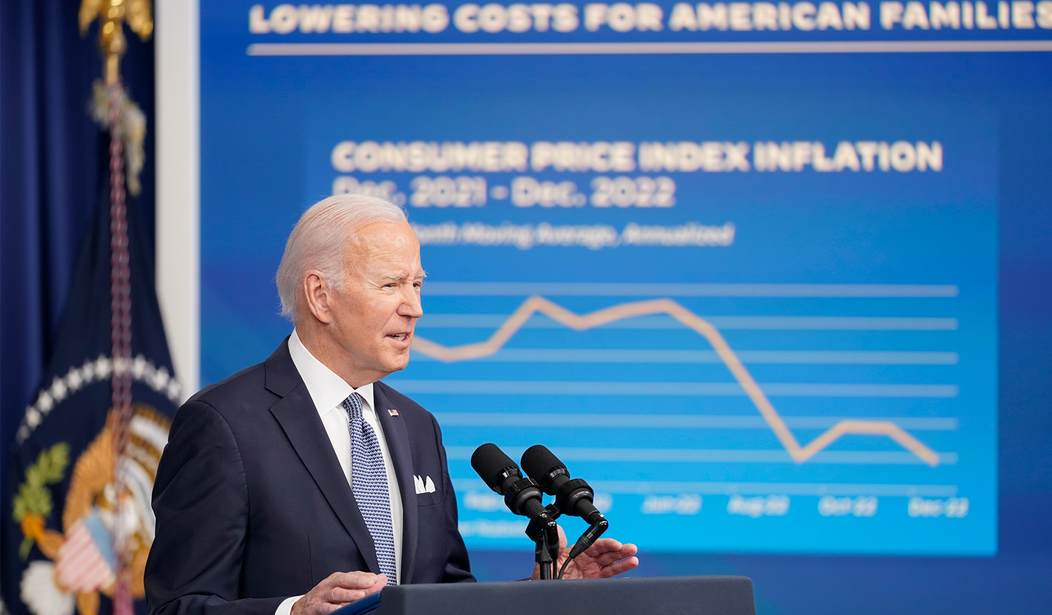The nonpartisan Congressional Budget Office (CBO) released its latest evaluation of the federal government's budget and America's economic outlook over the next decade this week and...the news isn't good.
On inflation, the CBO projects that inflation will begin to ease later in 2023 as a result of aggressive interest rate hikes by the Federal Reserve, but says it won't be until 2027 that "the rate of inflation is projected to reach the Federal Reserve’s long-run goal" of just two percent.
But the interest rate hikes — to a level not seen since the economic crisis of 2007-2008 — needed to drag inflation down will also mean real GDP "comes to a halt" in 2023. The CBO points out that grinding the economy to a halt would cause the unemployment rate to rise from 2023 "through early 2024."
When it comes to the federal budget, CBO's new projections say the federal deficit will come in at $1.4 trillion in 2023, followed by an average $2.0 trillion annual deficit from next year through 2033. The projected deficit this year would be 5.3 percent of the U.S. Gross Domestic Product (GDP), but expand to 6.9 percent by 2033. The CBO notes both numbers are well above "the 3.6 percent of GDP that deficits have averaged over the past 50 years."
"The cumulative deficit over the 2023–2032 period that we now project is $3 trillion larger than we projected last May," the CBO added, "mainly because of newly enacted legislation and changes to the economic forecast that boost interest costs and spending on mandatory programs." That is, Biden's frequent touting of his alleged "fiscal responsibility" that he says has reduced the deficit...has done the opposite.
Recommended
And the debt situation is set to grow even more out of control, according to the CBO:
Federal debt held by the public is projected to rise from 98 percent of GDP in 2023 to 118 percent in 2033—an average increase of 2 percentage points per year. Over that period, the growth of interest costs and mandatory spending outpaces the growth of revenues and the economy, driving up debt. Those factors persist beyond 2033, pushing federal debt higher still, to 195 percent of GDP in 2053.
On the current debate in Congress over the debt ceiling, the CBO projects that the current "extraordinary measures" being used by the Treasury Department to avoid defaulting on debts "will be exhausted between July and September 2023" but reiterated the exact timing is uncertain:
The projected exhaustion date is uncertain because the timing and amount of revenue collections and outlays over the intervening months could differ from our projections. In particular, income tax receipts in April could be more or less than we estimate. If those receipts fell short of estimated amounts—for example, if capital gains realizations in 2022 were smaller or if U.S. income growth slowed by more in early calendar year 2023 than we project—the extraordinary measures could be exhausted sooner, and the Treasury could run out of funds before July.
If the debt limit is not raised or suspended before the extraordinary measures are exhausted, the government would be unable to pay its obligations fully. As a result, the government would have to delay making payments for some activities, default on its debt obligations, or both.
So, inflation triggered by Biden's policies won't be back to its goal until 2027, the Fed's reaction to Biden-spurred inflation means there won't be growth in the economy, which means unemployment is going to spike through 2024. The current debt limit can only be maintained without default until as soon as July, and federal deficits are set to soar higher through the next decade as a result of policies implemented since May 2022.
Naturally, as Republicans have urged since Biden took office and began implementing his damaging economic policies, the CBO concludes that "changes in fiscal policy must be made to address the rising costs of interest and mitigate other adverse consequences of high and rising debt." Will President Biden or Democrats in Congress actually push to make these necessary changes? Don't wait up.
CBO Director Phillip Swagel discusses the current budget and economic outlook. https://t.co/vQCA36QCzi
— U.S. CBO (@USCBO) February 15, 2023























Join the conversation as a VIP Member